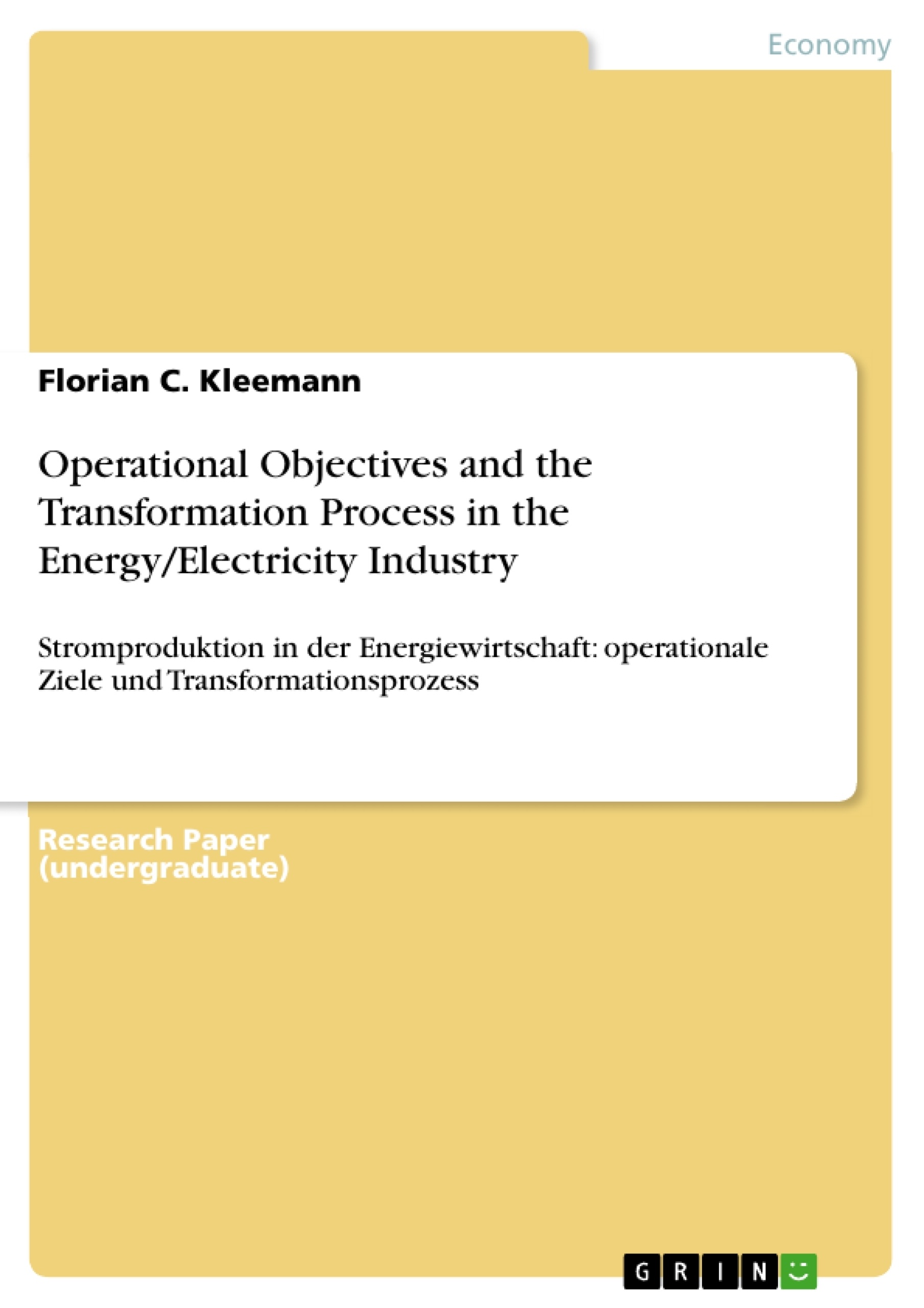Auf Basis eines grundlegenden Modells des transformationalen Produktionsprozesses (Input-Transformation-Output) wird der Herstellungsprozess von Strom anhand eines realen, anonymisierten Unternehmens aus der Energierwirtschaft beschrieben und analysiert. Auf das besondere Produkt (Dienstleistung) „Strom“ hin werden operationale Ziele der Produktionswirtschaft abgeleitet und kritisch analysiert. Da in diesem Gebiet kaum betriebswirtschaftliche Arbeiten bestehen, leitet die Arbeit einen wesentlichen Beitrag zu dieser Perspektive für die Energiewirtschaft.
Schlüsselwörter: Operations Management, Energieerzeugung, Energiewirtschaft, Stromproduktion, Produktionsprozess
Inhaltsverzeichnis (Table of Contents)
- Introduction
- The transformation process at EXAMPLE
- Definition of the EXAMPLE operations
- Characterisation of the key operations process
- Electricity – product or service?
- Operational objectives for EXAMPLE
- Conclusion
Zielsetzung und Themenschwerpunkte (Objectives and Key Themes)
This report aims to identify and describe the key transformation process and operational objectives of the electricity generator EXAMPLE. It analyzes the inputs, transformation process, and outputs of electricity generation, addressing the question of whether electricity is a product or a service. Based on this analysis, the report evaluates EXAMPLE's operational objectives.
- Transformation process of electricity generation
- Operational objectives in electricity generation
- Classification of electricity as a product or service
- Analysis of a real-world energy company's operations
- Cost and dependability in electricity production
Zusammenfassung der Kapitel (Chapter Summaries)
Introduction: This chapter introduces the concept of operational processes and their importance in businesses, both manufacturing and service-oriented. It establishes the framework for analyzing the transformation process and operational objectives of a case company, in this case, EXAMPLE GmbH, a German electricity generator. The chapter highlights the importance of understanding the transformation of inputs into outputs, emphasizing the growing role of services in operations and outlines the methodology of the report, which relies on both secondary research and information from within the model company. The focus will be on coal-fired plants due to the scope of the report.
The transformation process at EXAMPLE: This chapter delves into the detailed analysis of EXAMPLE's operations. It defines the company's operations, characterizes its key operational processes (with a focus on continuous material processing in coal-fired plants), and examines the critical question of whether electricity should be classified as a product or a service. The chapter analyzes the inputs (transformed resources like fuel and transforming resources such as the power plant and staff), and the outputs (electricity and by-products). By examining the tangible and intangible aspects of electricity, it determines that while electricity shares characteristics of both, the distinction doesn't significantly impact EXAMPLE's operations.
Operational objectives for EXAMPLE: This chapter assesses EXAMPLE's operational objectives based on its transformation process and customer expectations. It identifies high dependability and cost focus as dominant objectives, strongly linked to volume flexibility. The chapter explains how EXAMPLE achieves these objectives through a continuous production process aiming for high plant utilization to minimize unit costs, while managing a fleet of power plants to meet fluctuating electricity demand. This section likely details strategies for balancing these often competing objectives.
Schlüsselwörter (Keywords)
Operations Management, Energy Generation, Energy Industry, Electricity Production, Production Process, Operational Objectives, Transformation Process, Continuous Material Processing, Product-Service Distinction, Dependability, Cost Efficiency, Volume Flexibility.
Frequently Asked Questions: EXAMPLE GmbH - A Case Study in Electricity Generation
What is this report about?
This report is a comprehensive analysis of the operational processes and objectives of EXAMPLE GmbH, a German electricity generator. It focuses on the transformation process of electricity generation, examining the inputs, the process itself, and the outputs. A key aspect is determining whether electricity should be classified as a product or a service. The report also details EXAMPLE's operational objectives, primarily cost efficiency and dependability.
What are the key themes explored in the report?
The report explores the transformation process of electricity generation, focusing on continuous material processing in coal-fired plants. It examines EXAMPLE's operational objectives, including cost efficiency, dependability, and volume flexibility. A significant theme is the classification of electricity as a product or service, and how this classification affects operational strategies.
What is the methodology used in the report?
The report utilizes a combination of secondary research and information obtained from EXAMPLE GmbH. The focus is on coal-fired plants due to the scope of the study. The analysis examines the inputs (transformed and transforming resources), the transformation process, and the outputs (electricity and by-products) of electricity generation.
How does the report define and characterize EXAMPLE's operations?
The report defines EXAMPLE's operations by characterizing its key processes within coal-fired power plants. This involves analyzing the continuous flow of materials throughout the generation process. It examines the inputs (coal, water, personnel, etc.) and outputs (electricity, waste products), ultimately concluding on the nature of electricity as a product or service in the context of EXAMPLE's operations.
What are EXAMPLE's operational objectives?
EXAMPLE's primary operational objectives are high dependability and cost efficiency. These are intrinsically linked to volume flexibility, requiring a balance between meeting fluctuating electricity demand and minimizing production costs through high plant utilization and efficient management of its power plant fleet.
How does EXAMPLE achieve its operational objectives?
EXAMPLE achieves its objectives through a continuous production process designed for high plant utilization to reduce unit costs. Simultaneously, it manages a fleet of power plants to adapt to fluctuating electricity demand. The report likely details specific strategies for balancing these often competing objectives.
What is the conclusion of the report?
The report concludes by summarizing the analysis of EXAMPLE's transformation process and its operational objectives. It synthesizes the findings regarding electricity classification and provides insights into how EXAMPLE strategically balances cost efficiency, dependability, and volume flexibility within the electricity generation sector. The exact conclusion will depend on the detailed analysis within the full report.
What are the key words associated with this report?
Operations Management, Energy Generation, Energy Industry, Electricity Production, Production Process, Operational Objectives, Transformation Process, Continuous Material Processing, Product-Service Distinction, Dependability, Cost Efficiency, Volume Flexibility.
- Citar trabajo
- Florian C. Kleemann (Autor), 2009, Operational Objectives and the Transformation Process in the Energy/Electricity Industry, Múnich, GRIN Verlag, https://www.grin.com/document/190102



